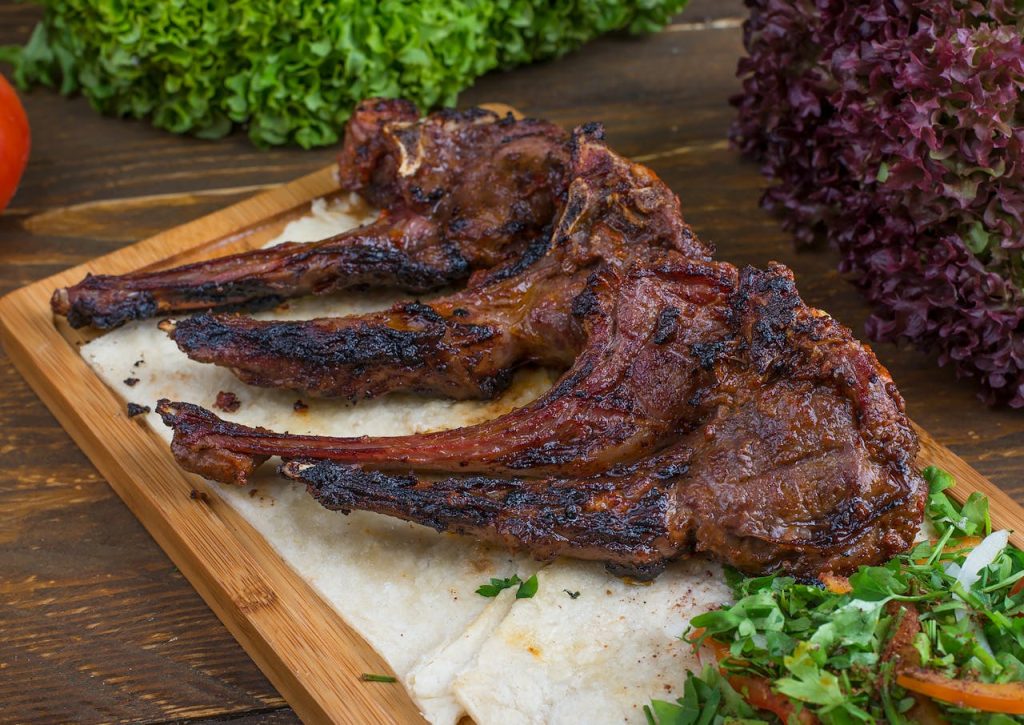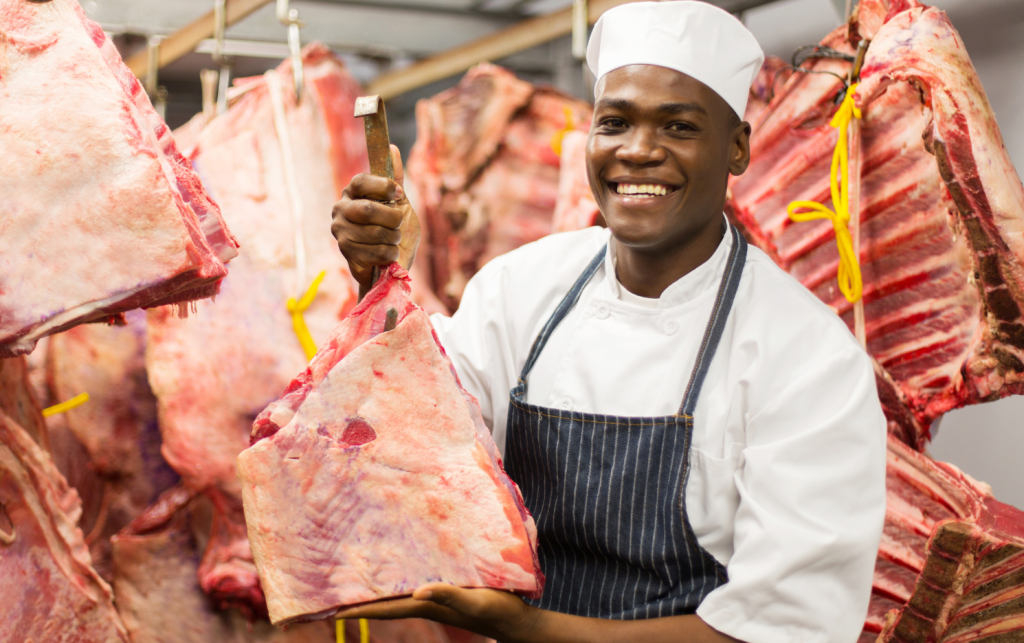The butchery business in Kenya has long been a staple in both urban and rural areas.
With a strong demand for meat products across the country, many entrepreneurs consider opening a butchery as a viable business opportunity. But is it truly profitable?
In this guide, explore the profitability of the butchery business in Kenya, examine profit margins, and outline the necessary steps and requirements for starting and running a successful butchery.
If you are just getting started, learn how to write a business for your butchery business.
Is Butchery Business Profitable?
The butchery business in Kenya can be highly profitable if managed correctly. The key factors that contribute to its profitability include location, quality of products, pricing strategy, and customer service.

Urban centers like Nairobi, Mombasa, Nakuru, Thika, and Kisumu offer higher profit potential due to the dense population and higher purchasing power. However, even in smaller towns and rural areas, butcheries can thrive if they cater to the local demand and maintain a loyal customer base.
Seasonality can also affect profitability. For instance, demand for meat often spikes during festive seasons, holidays, and special occasions, leading to higher sales. On the flip side, fluctuations in livestock prices, competition, and supply chain issues can impact profit margins.
What is the Profit Margin in the Meat Business in Kenya?
Profit margins in the meat business vary depending on several factors such as the type of meat sold, the scale of the operation, and the location. On average, a well-run butchery can expect a profit margin ranging from 10% to 30%.
Beef and goat meat tend to offer higher margins due to their popularity among Kenyan consumers. Additionally, value-added products such as sausages, marinated meat, and kebabs can significantly increase profit margins as they often command higher prices.
It’s important to note that expenses such as rent, utilities, staff wages, and licensing fees can impact overall profitability. Efficient management, proper pricing, and reducing wastage are essential to maximizing profit margins.
What Products Are Sold in a Butchery?
A butchery typically offers a wide range of meat products to cater to diverse customer preferences. Common products include:
- Beef: Different cuts such as fillet, sirloin, ribs, and ground beef.
- Goat Meat: Popular in many Kenyan households, particularly for traditional dishes.
- Pork: Including pork chops, bacon, and sausages.
- Chicken: Whole chickens, thighs, wings, and breasts.
- Lamb: Lamb chops, legs, and shanks.
- Fish: In coastal areas, fish and other seafood are also sold in butcheries.
- Offals: Liver, kidneys, and tripe, which are in high demand among some customers.
- Processed Products: Sausages, burgers, and marinated meat.

Some butcheries also diversify by offering frozen vegetables, spices, and cooking oils, providing customers with a one-stop shop for meal preparation.
How Much Does One Need to Start a Butchery in Kenya?
The cost of starting a butchery in Kenya varies depending on the location, size, and scale of the operation.
On average, you can expect to invest between Ksh.300,000 to Ksh.1 million. Here’s a breakdown of the key expenses:
- Rent and Renovations: Ksh.50,000 to Ksh.200,000 depending on location and shop size.
- Licensing and Permits: Ksh.10,000 to Ksh.20,000, including business registration, health permits, and meat handling certifications.
- Equipment: Ksh.100,000 to Ksh.400,000 for essential equipment like display refrigerators, meat slicers, weighing scales, and cutting tables.
- Stock: Initial purchase of meat stock could range from Ksh.50,000 to Ksh.200,000 depending on the variety and quantity.
- Staffing: Ksh.20,000 to Ksh.100,000 for salaries, depending on the number of employees and their roles.
- Miscellaneous: Ksh.20,000 to Ksh.50,000 for branding, marketing, and other operational costs.
What Are the Requirements for Running a Butchery?
To run a butchery in Kenya, you must meet several legal and operational requirements:
- Business Registration: Register your business with the relevant government bodies to operate legally.
- Health Permits: Obtain a health certificate from the local county government, ensuring that your premises meet hygiene standards.
- Meat Handling Certification: Staff must be trained and certified in meat handling to comply with food safety regulations.
- Business Licenses: Acquire a business permit from the county government, which allows you to operate within the jurisdiction.
- Kenya Bureau of Standards (KEBS) Certification: If you plan to process and package meat products, you’ll need certification from KEBS.
- Compliance with Public Health Regulations: Regular inspections ensure that your butchery adheres to the public health standards set by the Ministry of Health.
Equipment Checklist: Equipment Needed for a Successful Butchery
A successful butchery requires the right equipment to ensure efficient operations and maintain high hygiene standards. Here’s a checklist of essential equipment:
Display Refrigerators
Display refrigerators are specialized units designed to keep meat products fresh while showcasing them to customers. They maintain a cool temperature to prevent spoilage and often have glass doors to allow easy viewing. They keep the meet fresh and visually appealing. They cost anywhere from Ksh.50,000 to 150,000 depending on the size, features and brand.
Deep Freezers
Deep freezers are large, insulated units used to store bulk meat products at freezing temperatures. This equipment is crucial for preserving meat for extended periods without compromising quality. It costs anywhere from Ksh.40,000 -100,000.
Meat Slicers
Meat slicers are mechanical devices used to cut meat into thin, even slices. They are essential for producing uniform cuts of meat, which is particularly important for items like steaks, ham, and deli meats. It costs anywhere from Ksh.20,000-60,000.
Weighing Scales
Digital weighing scales provide precise measurements for meat portions, ensuring customers receive the correct quantity and helping you maintain pricing accuracy. You can buy a weighing scale for Ksh.5,000 to Ksh.15,000 depending on the capacity.
Cutting Tables
Stainless steel cutting tables are durable, easy to clean, and resistant to corrosion, making them ideal for the hygienic preparation of meat. They provide a sturdy surface for cutting and preparing meat products. It costs anywhere from Ksh.10,000 – 30,000 depending on size and quality.
Butcher Knives
Butcher knives come in various sizes and shapes, each designed for specific tasks such as slicing, dicing, or deboning meat. High-quality knives are crucial for efficient and safe meat preparation. You can expect to pay Ksh.1,000 to Ksh.5,000 per knife, depending on the brand and type.
Bone Saw
A bone saw is a specialized saw used to cut through bones and large pieces of meat. It ensures clean cuts, especially when dividing carcasses or large joints of meat. Its costs between Ksh.10,000 to Ksh.40,000 depending on whether it is manual or electric.
Cash Register/Point of Sale System
A cash register or POS system will help you process transactions, manage sales records, and track inventory. Modern POS systems also integrate with digital payment methods, improving efficiency. A complete POS system can cost from Ksh.20,000 to Ksh.50,000.
Hygiene Equipment
Hygiene equipment includes hand washing stations, disposable gloves, aprons, and sanitizers. These are vital for maintaining cleanliness and preventing contamination in the butchery. You can expect to pay Ksh.5,000 to Ksh.15,000 for basic hygiene supplies, depending on quantity and quality.
Packaging Materials
Packaging materials, such as plastic wrap, butcher paper, and labels, are used to wrap and label meat products for sale. Proper packaging helps preserve meat freshness and provides necessary product information to customers. You can incur as low as Ksh.2,000 to Ksh.10,000 depending on the quantity and type of materials.
Conclusion
The butchery business in Kenya is a promising venture with the potential for significant profitability. Success in this industry hinges on strategic planning, including choosing the right location, offering high-quality products, and maintaining excellent customer service.
With the right equipment and adherence to legal requirements, a butchery can cater to the ever-growing demand for meat in the Kenyan market. While the initial investment may seem substantial, the returns can be rewarding, making the butchery business a viable option for aspiring entrepreneurs.


